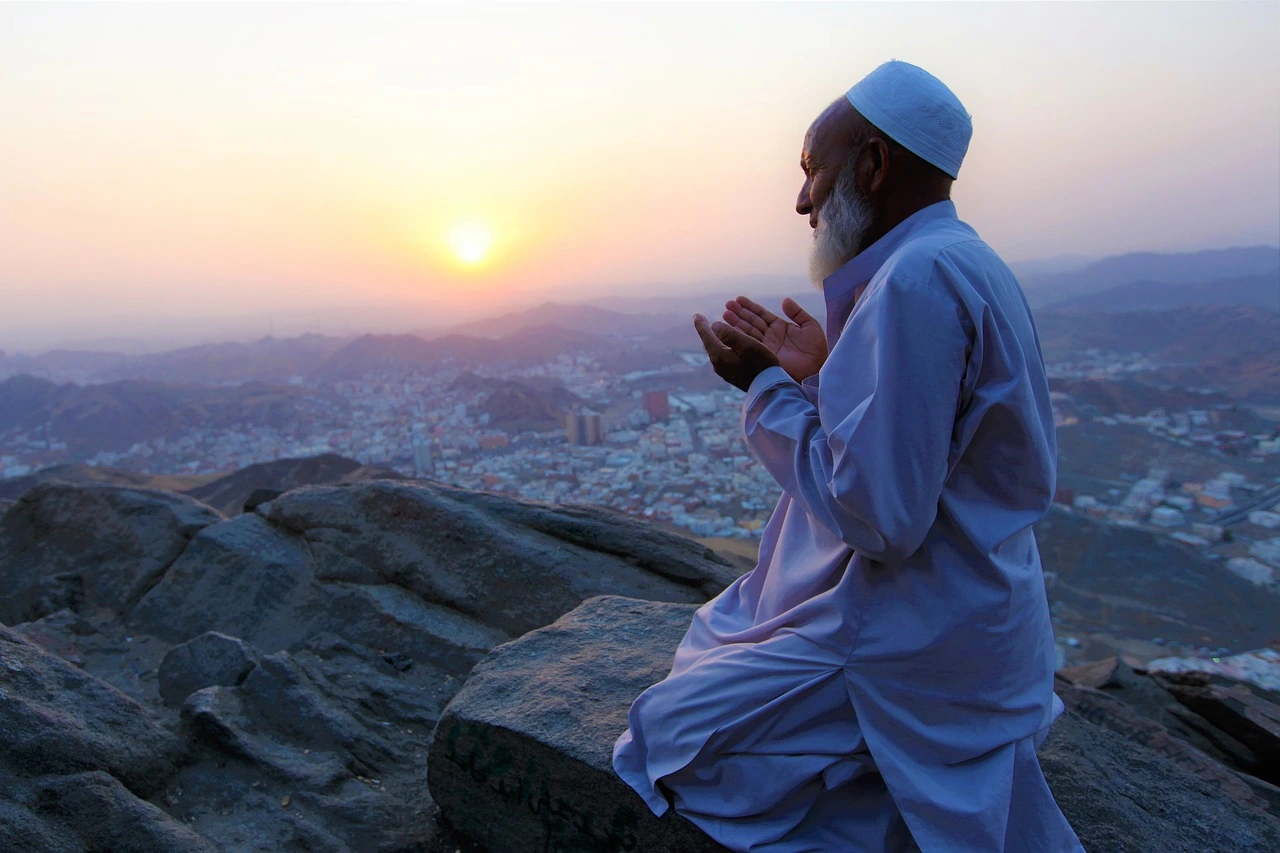It is a unique time of year, Ramadan so you must know Powerful Duas for Fasting. During the holy month, we have the chance to strengthen our relationship with Allah (swt), consider our religion, and get great rewards because every good deed is multiplied by 70. Making duaa at this period is crucial because duaas from those who are fasting are easily accepted.
One of the tenets of Islam is fasting, which every fit Muslim must observe. When we fast, we have to give up all food, liquids, and social interaction from sunrise to sunset. This is a great moment to push yourself and get stronger.
Powerful Duas for Fasting
Sawm, or fasting, is one of the five pillars of Islam. Every year, during the month of Ramadan, Muslim brothers and sisters throughout the world begin and end their fasts. So they search always for Powerful Duas for Fasting.
However, did you know that fasting is acceptable all year round and not only during Ramadan?
The Prophet Muhammad (peace be upon him) is said by Tirmidhi to have stated that “deeds are presented on Monday and Thursday. Thus, I love for my deeds to be presented while I am fasting.”
Additionally, it is advised to fast on what are known as “White Days,” which are the three middle days of each month when the moon is full.
What are the finest duas to say when beginning and ending your fast with food, then?
Ramadan’s spiritual importance
The ninth month in the Islamic calendar is Ramadan, which is revered as the most significant month for Muslims worldwide. People fast every day from sunrise to sunset throughout this month, depriving themselves of food, liquids, and other necessities.
Ramadan is a period for introspection, growth, and adoration of Allah. One of the Five Pillars of Islam, which are the fundamental acts of devotion that are required of all Muslims, is fasting throughout the month of Ramadan.
For Muslims, Ramadan is a season of spirituality. Ramadan, a month that represents commitment, introspection, and self-control, enables us to protect ourselves from sin by fasting and saying powerful Duas for Fasting.
Not only is fasting encouraged, but greater acts of worship are also prioritized. Prayer, dhikr, reciting the Qur’an, offering alms, dua for fasting Ramadan, and pleading with Allah (SWT) for pardon are some examples of these deeds.
By engaging in such deeds that please Allah (SWT), we strengthen our bond with our Creator and receive additional blessings during this auspicious month.
The value of community in the month of Ramadan
Without a doubt, Ramadan is a season when the community comes closer to Allah (SWT) and one another.
Since Islam’s five pillars include fasting, Muslims of all ages, backgrounds, and circumstances are united by the significance of fasting throughout the month of Ramadan.
During Ramadan, our communities participate in events that incorporate everyone in some manner, whether it be large-scale Iftars, neighborhood street food vendors, or getting together for Taraweeh in nearby mosques!
In a similar vein, we collaborate throughout Ramadan to fulfill Zakat, another essential component of Islam. Giving to people in need has long been cherished by the Muslim community, dating back to the Prophet Muhammad (peace and blessings be upon him).
Since Ramadan offers the greatest chance to get blessings from Allah (SWT), a lot of us decide to provide our charity, or Zakat, during this auspicious month.
Many Muslims join together to attempt to observe Laylatul Qadr, or the Night of Power, particularly during the final 10 nights of Ramadan.
We should all pray more, saying powerful Duas for Fasting, and contribute more to charity as a community on Laylatul Qadr, which is regarded as the holiest night of the year.
All community members get together to celebrate Eid-ul-Fitr, a joyful occasion for exchanging gifts, indulging in moderation, and spending time with our loved ones when Ramadan ends.
An auspicious period for introspection and more blessings, Ramadan is significant to every Muslim’s life.
Ramadan is indeed a time when our spirituality, relationships with our family and community, and our ability to elevate our acts of devotion for Allah (SWT) all become stronger and enable us to become the greatest versions of ourselves.
What are Powerful Duas for Fasting and the best time to say Duaa in Ramdan?
What if I told you that there are two tremendously significant moments throughout Ramadan when you have a very excellent chance of getting your desires realized if you make dua?
The Prophet said, in response to a question concerning which dua is most frequently heard or accepted:
“The final part of the night, the dua.”
Powerful Duas for Fasting: Before Fajr
This is the pre-Fajr period. Why then is this moment so unique? Because today is the hour that Allah has designated for His glorious descent. Every night, He ascends to the lowest sky and extends a summons to those who will make their plea.
But when we are fast asleep and find it difficult to get out of bed and choose to get up and make dua, this is also the moment when we are the most careless.
- If you don’t have a strong drive and convincing honesty, you won’t do this.
- If you don’t genuinely think that Allah will hear you when you call upon Him at this hour, you won’t leave your comfort.
- If you are not serious and real in your desire to achieve your goals, you will not wake up from your sleep.
- If you are not sincere in your repentance and forgiveness-seeking, you will not leave your state of rest.
Therefore, Allah guarantees a certain favorable reaction to your appeal when you exhibit this unshakeable sincerity and desire and get out of bed to invoke your Lord at this very moment. As he descends to the lowest realm of heaven, he says:
Who will summon Me so I may respond to him?
You may ask Allah for anything right now, and He will grant your request. He declares:
Who will beg Me to give it to him?
If you beg for forgiveness now, as He has promised, you will be forgiven. He declares:
who will ask for my pardon for me to forgive him.
Therefore, you should not miss dua for fasting in Islam this extremely honorable and special time at least during Ramadan because of the virtues of this wonderful month, which make this hour even more special and virtuous. It is also undoubtedly easier to attend this time during Ramadan than it is outside of it because, after all, you get up for sahur. It is customary to eat before morning, and the prophet advocated consuming sahur.
Thus, even if you take a drink of water, don’t miss it. Sahur is significant because it provides you with the energy you need to worship Allah all day long through dhikr, the Quran, and prayers.
A person in starvation cannot function adequately throughout Ramadan. He lacks the zeal and heartiness needed to properly observe the fast since he is lethargic.
Since abstaining from food and liquids is only one aspect of fasting, you also need to abstain from foul language and immoral behavior.
And since it keeps you from becoming overly hungry, sahur aids in maintaining social graces. Hunger might lead to rude behavior, which reduces the benefits you receive. Thus, aim to rise a few minutes early for sahur and set aside some time for istighfar and dua.
I have something to tell you that will encourage you even more to offer up a dua within this limited period.
When Allah lauded His believing slaves in the Quran, those who would enter Jannah and reside therein eternally, He revealed that one of their distinguishing characteristics was that they used to beseech Allah for forgiveness before morning, even asking in the hours before dawn.
Shortly before Maghrib
The second excellent time for powerful Duas for Fasting occurs right before Maghrib when you are most vulnerable and aware of your weakness without even the most necessities that Allah provides for you. At this time, you are hungry, thirsty, and feel like you are at your weakest.
You are humbled right now, and you have a greater chance of receiving a response to your du’a if you make it with this humility in your heart.
But at this hour, aren’t we always too busy getting ready for iftar? So much so that we fail to see how quickly these priceless moments are passing us by.
However, that is no longer the case, dear sister! Let’s finish up our tasks and shut the kitchen a few minutes before iftar so that we can offer dua and istighfar during Ramadan, insha’Allah.
3 Powerful Duas for Fasting in Ramadan You Must Be Aware of
During Ramadan, we are instructed to recite certain duas from the beginning to the end of the fast. For those who would rather read the transliteration, we have included the English duas with the six duas listed below for you to commit to memory.
Upon seeing the waning moon:
Translation: “Oh Allah, grant that it is a beginning marked by safety, faith, peace, and Islam. Allah is both your and my lord.”
Pronunciation by English letters: “Allahumma Allahu alayna bil-amni wal-iman was-salaamati wal-Islam. Rabbi wa rabbuka Allah.”
In Arabic: “اللَّهمَّ أَهلَّهُ علينَا بالأمنِ والإيمانِ والسَّلامةِ والإسلامِ ربِّي وربُّكَ اللَّهُ”
To demonstrate how peace and faith are related, this prayer links them. The Arabic terms ‘Amn’ and ‘Iman’ are derived from each other.
The dua also connects the terms “Islam” and “peace,” “Silm” and “Islam,” which are related linguistically. During this Ramadan, we pray to Allah for serenity and strength in our faith.
The prayer to break the fast:
Translation: “I’m going to continue keeping my Ramadan fast tomorrow.”
Pronunciation by English letters: “Wa bisawmi ghadinn nawaiytu min shahri Ramadan.”
In Arabic: “وَبِصَوْمِ غَدٍ نَّوَيْتُ مِنْ شَهْرِ رَمَضَانَ”
Eating anything is a sunnah of the Prophet (ﷺ) and is highly encouraged, even if it’s only something simple like some dates and water. When starting acts of worship, such as breaking the fast, it’s important to start with an intention or dua, whether you declare it or keep it secret.
The prayer to break a fast:
Translation: “The recompense is validated by God’s will, the veins are soaked, and the thirst has vanished.”
Pronunciation by English letters: “Dhahaba adh-Dhama’ wabtallatil-urooq wa thabatal-ajr inshaa’Allah.”
In Arabic: “ذهب الظمأ وابتلت العروق وثبت الأجر إن شاء الله”
The Prophet (ﷺ) said that one of the finest times to make dua is during the breaking of the fast.




